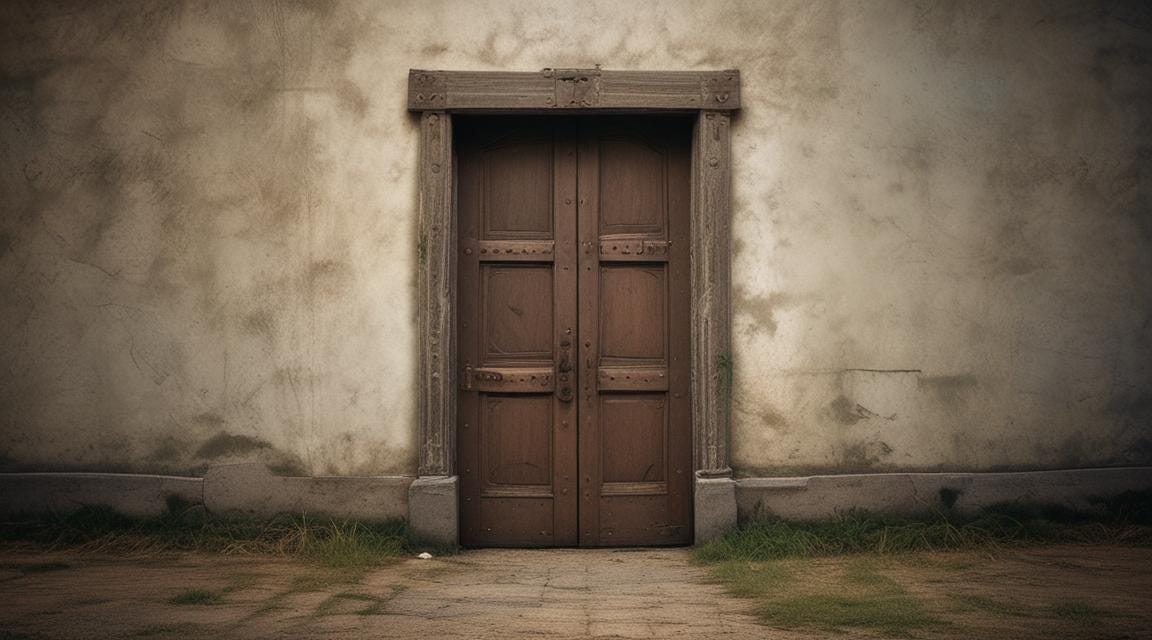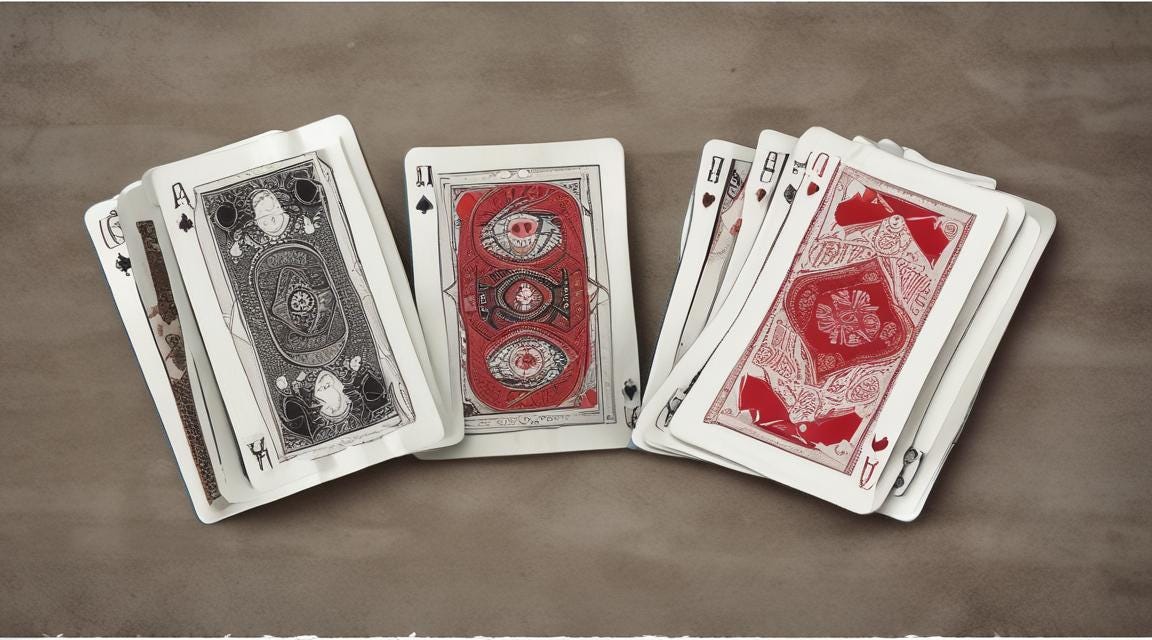The Dangerous Illusion of Good Judgement: How We Misjudge Probability and What to Do About It
Once you've made your mind, should you change it?
Research suggests that we take about 35,000 decisions per day. We like to think that we take good decisions: rational, informed and accurate judgments. Are they really?
Here is a nice little puzzle:
The Monty Hall problem
You are live on a TV show. Lights on, attention is on you.
You see three closed doors in front of you. The show presenter tells you that two of them hide a goat behind them, while the other one hides a brand-new car. You can choose any of the three doors, and you will get whatever is behind it.
After you choose one of the doors, the show presenter opens a different door and you see a goat.
The show presenter gives you the opportunity to change your choice.
You start wondering “Did I choose the right door and he is playing with my mind? Or did I actually choose a bad door, but he knows that I will think that he wants me to change my mind and thus I won’t change it? Does it even matter?”
What do you do? Do you change your choice?
Think about it for a couple minutes before continuing
A first guess
If you are like most people, you are probably thinking that it doesn’t matter. Your argument is something like this:
At the beginning all doors are equally likely to hide the car. That is, there is a 33% probability that I got the winning door.
Now one of the doors with a goat is opened. My door had a 33% probability of having the car, and the one that I did not choose and was not opened also had a 33% probability of winning the car.
Therefore my door and the remaining door have the same probability of having the car: it does not matter which one I choose.
This is a very common argument. It seems to make sense…right?
You can test this with the following little experiment:
Find a friend or family member that believes they should not change their minds (unless they have heard this puzzle before, they probably will!)
Get a deck of cards and pull out two 2’s and one Ace
Shuffle these three cards and put them face down. You need to know where each card is (but your friend shouldn't)
Ask them to select one of the down-facing cards
Among the two cards that your friend didn’t select, you (who knows where the 2’s are) turn up one of the 2’s
Your friend, sure of their decision, decides not to change their mind
They turn around the card they selected
According to the reasoning above, your friend should find the Ace about half of the times. Instead, if you actually play this game several times, you will see that your friend was wrong most of the times.
In fact, they will be wrong 66% of the time!
This is a HUGE difference! They are twice as likely to get an Ace if they change their choice.
What is going on?
Don’t worry, you are not horrible at making decisions.
How do we decide things in life?
Say you want to choose a restaurant for dinner. You look at the information you have and take the best possible decision based on that information. If new information becomes available (e.g. the restaurant you chose gets a really bad review), you might want to change your choice.
Here is the key to the Monty Hall problem:
The information you had when you made the first decision is NOT the same you have when you are giving the option to change.
But why???
At first we had no information whatsoever. It did not matter at all which door we chose: guessing is the best thing we could have done.
Now one of the doors is opened. This is certainly new information—but it’s hard to see how it changes things.
Imagine that you chose the right door at the beginning. You are winning—you do not want to change your mind!
Imagine that you chose one of the wrong doors. After the other wrong door is open (remember a door with a goat is opened), the other door has to have the car. You should certainly change your mind!
That is, in Case 1 you do not want to change your mind, whereas in Case 2 you do.
Now here is there key: Case 1 happens 33% of the times (you initially chose the right door), while Case 2 happens 66% of the times (you chose one of the two doors with a goat). That is, it is twice as likely that you are in a situation where you should change your mind.
What is the new information that we are getting in this game?
At first we know nothing—all doors are equally likely. Once one door is opened, and it is one of the doors you did not choose, you know that that door doesn’t have the car. The key here is that it is one of the doors that you initially did not choose. It is telling you that the 66% probability that the car was in one of the two doors that you did not initially chose is now concentrated in only one door (the remaining one).
Fun game…but what about real life?
The thing above is not just a puzzle to play in your mind or with some friend and a deck of cards.
It actually happens in real life..
Sure, three goats and a car are unlikely to appear in your life. But the point is that as new information comes in, you should review your choices. And, sometimes, it is even hard to realise what information we have.
Am I infected?
We recently had a COVID pandemic. One of the main difficulties of dealing with it was that there were many asymptomatic cases (or the symptoms were delayed). We started using antigen tests.
These tests are about 85% likely to turn positive if you have COVID. On the other hand, about 5% of the time these tests show positive even though you don’t have COVID (the famous ‘false positives’).
Suppose that at some point 1% of the people in your country have COVID. You take a COVID test and it turns out positive. Do you think you have COVID?
The first thing that probably came to your mind was: of course I have COVID—there is an 85% chance I do!
This is wrong. Remember to think about the what information you have:
85% is the probability that someone testes positive (outcome) if they have COVID (information).
We want to know the probability that some has COVID (outcome) knowing they tested positive (information).
In one case the information is having COVID, in the other testing positive. You need to really think what information you have.
Here is a surprise:
The probability that you have COVID is only 15%!1
How are we using new information?
Without any information (no test), if I pick a random person in the street they have a 1% probability of being infected.
With the new information given by a positive test, that probability is now much higher: 15%.
Information—the test—changed how likely we think it is that someone has COVID.
(Still, this probability of 15% is probably much lower than you expected.2 In his great book “Thinking, Fast & Slow”, Nobel Prize psychologist Daniel Kahneman explains that it is very common for our intuition (what he calls “System 1”, the ‘fast’ thinker inside us) to be wrong in this kind of questions. Luckily, when intuition fails something like mathematics (what he calls “System 2”, the ‘slow’ thinker inside us) helps!)
Estimating the likelihood of events is tricky, and information changes our estimations. To understand how information should change our judgements, it is essential to pin down what information we have.
And be careful!
Other times we think that new information should change our minds, when it actually shouldn’t! Here are some common misbeliefs:
Just because your friend won the lottery last week (information), they are not less likely to win it again this week (outcome).
If you toss a coin and you see ten heads in a row (information), it is not less likely that another head comes (outcome).
A question for you
Sometimes it is obvious that new information changes the likelihood of outcomes, others it is not, and others it simply doesn’t. Remember to always ask:
What information do I have, & should I change my mind accordingly?
See you next Sunday!
I am experimenting with topics to see what is more interesting to you guys. Whether you prefer finance content like last week or something like this week, let me know below!
If you know some probability and Bayes theorem you can calculate this. Otherwise, believe me and don’t unfollow, I might explain in another post!
Vote in the poll if you would like to understand where this comes from.





